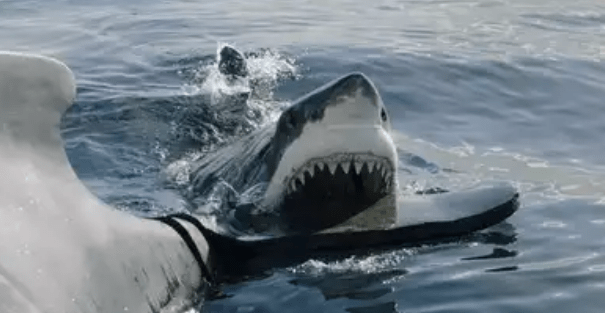By Islam Salah
The shores of Marsa Alam, a popular Red Sea destination, were recently shaken by a tragic shark attack that claimed one life and left another person injured. These incidents have sparked concern among locals and tourists alike, raising questions about what might be driving sharks closer to shore.
Among the theories gaining attention is the impact of commercial fishing practices, which many believe may be disrupting marine ecosystems and altering shark behavior.
A Pattern of Shark Attacks
Shark attacks in the Red Sea are not unprecedented, but recent incidents have left a lasting impact. The latest tragedy in Marsa Alam saw one tourist lose their life and another suffer injuries, rattling both visitors and locals.
These events have cast a shadow over the region’s thriving tourism industry, raising concerns about safety among potential travelers and businesses dependent on tourism. As shark attacks increase in frequency, questions arise: What is driving sharks closer to popular swimming areas, and how can these risks be reduced?
The Role of Commercial Fishing Practices
Commercial fishing in the Red Sea has long been a point of dispute, particularly in relation to shark attacks.
Fishing boats often dump waste and bycatch into the water, which can attract sharks closer to the shore in search of food. This practice disrupts the natural balance of marine ecosystems, drawing predators into areas frequented by tourists.
Besides that, some commercial fishing operations use banned methods like dredging and illegal nets, which not only damage coral reefs but also deplete fish stocks crucial to the region’s ecological health.
The cumulative effect is a strained environment where marine life struggles to thrive, potentially pushing sharks closer to human activity.
Economic Implications of Shark Attacks
Tourism, particularly diving and eco-tourism, is a cornerstone of the Red Sea region’s economy, attracting millions of visitors annually. However, shark attacks deter tourists and threaten the livelihoods of local businesses.
While commercial fishing offers short-term economic gains, the long-term impact of harming the marine environment is far more damaging. The depletion of fish stocks, the destruction of coral reefs, and the resulting decline in tourism revenue create a fragile economic situation.
The temporary profits from fishing pale in comparison to the sustainable income that a healthy marine ecosystem and thriving tourism industry can generate.
Government and Public Responses
In response to the recent shark attacks, Egypt’s Ministry of Environment has taken swift action, including closing affected areas and issuing stricter advisories for tourists. On another note, public figures like Naguib Sawiris have called for a ban on commercial fishing in tourist-heavy regions, citing its environmental and safety risks.
Broader public outcry echoes these concerns, with increasing calls for stronger regulation and enforcement to protect both marine life and the local economy from further harm.
A Call for Change
The link between harmful fishing practices and the rise in shark attacks in the Red Sea is clear. Commercial fishing activities, from waste dumping to the use of banned nets, are destabilizing the marine ecosystem and pushing sharks closer to tourist areas.
To protect both the local environment and the thriving tourism industry, it’s crucial for the government, businesses, and the public to collaborate on enforcing stricter regulations.
WE ALSO SAID: Don’t Miss…6 Sharks You Might Encounter While Diving In The Red Sea



